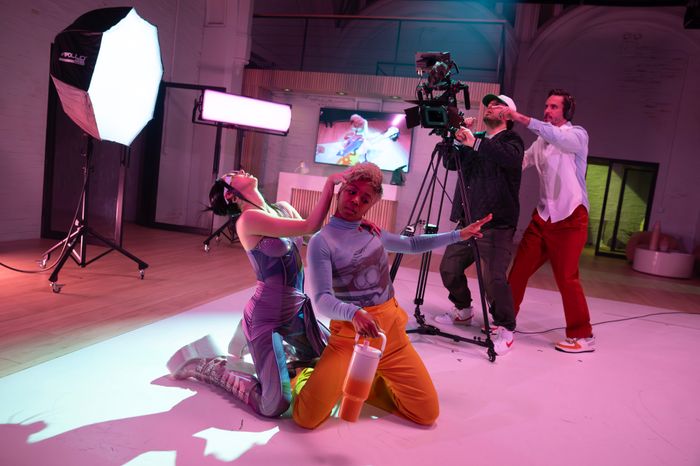
There’s conversation, and then there’s The Conversation. One is small talk, the other big. One is how people speak when they don’t care who’s listening, and one is how people publicly perform their commitment not so much to being ethical as to being current — and, if at all possible, profitable. Ife Olujobi is out to skewer both in her new play, Jordans, a satire with a skewed, nightmarish edge. As such, Jordans joins a long, rich tradition, one that has been particularly vigorous in recent years. During its two-ish hours, I thought of Mara Nelson-Greenberg’s Do You Feel Anger?, Jordan E. Cooper’s Ain’t No Mo’ (which also began life in the Public’s LuEsther Hall), Slave Play, Sorry to Bother You, and Get Out. Jordans doesn’t come together with the astonishing force of some of its companions in the form, but it’s definitely taking a daring half-court shot. “Well, the playwright is fearless,” the man sitting beside me said under his breath as the show swung into its second act. Twenty or so minutes later, he added, “Okay … what are you doing?”
I won’t spoil anything major, but the show makes clear early on that we’re going on a ride. You can feel it in the tone — the bubbles and cracks in the slick semblance of normalcy. Cha See’s lights flicker, the actors’ bodies warp and tremble, and Fan Zhang’s underscoring throbs with surreal menace. (Zhang is the production’s undercover hero; her sound design is a pulsing, ever-transforming constant, doing some serious heavy lifting in a play that has to navigate long stretches of action without dialogue.) If the creepy-crawly vibes weren’t enough, well, there’s also the content warning: “Jordans contains sexually explicit content, nudity, vomit, violence, and blood.” Oh, and smoking and strobe lights. Woo! This place has everything. But even if you’re headed for a wild R-rated showdown, satire is still a deceptively tricky genre. In its attempts to be cutting, it can end up being obvious; it also risks losing track of what exactly it came here to do besides excoriate. Olujobi gets stuck in both these corners, but at the same time, they’ve got a keen ear and a high-powered bullshit meter, and there are moments when Jordans’ pointed nails do indeed leave a mark.
The title refers to a pair of characters who will end up, like matter and anti-matter, tearing each other apart. The first is Jordan (Naomi Lorrain, whose silent facial expressions are wonderfully calibrated), the receptionist and all-around abused dogsbody at Atlas Studios, a sickeningly trendy “rental studio and production facility” in an unnamed location that’s obviously Williamsburg or Bushwick. Atlas hosts photo and video shoots, launch parties, and whatever else. It’s “the kind of place where anything can happen for a price,” Olujobi’s stage directions note dryly. (It’s a great gag when, eventually, one of the white ensemble members — Brian Muller, nailing it — shows up as Lil Klonopin, a face-tattooed, G-Star-wearing “rapper and influencer” who’s introducing his new line of watchbands.) Jordan is Atlas: She does all the work, makes all the coffee, orders all the salads, picks up all the dry cleaning; she carries the world on her shoulders. It isn’t a subtle image, but it’s central to Olujobi’s project. Jordan is the only Black person at Atlas, and she’s a woman, and while it’s pretty blatant to have her lugging furniture across the back of the stage while two of her white-lady colleagues make a feminist speech to their white-lady boss — “Here in this office … who is really doing the work? … Like, who has to be the mom, the babysitter, and the maid? … Who is literally slaving away, morning till night, nonstop, and not getting any credit?” — it’s still an observation with a whole-ass leg to stand on. Jordan already lives in a nightmare. “I work in an office owned by an evil succubus, staffed by little L-train demons,” she shudders. Then Jordan shows up.
I’ll call him Guy-Jordan for clarity. Guy-Jordan (Toby Onwumere), a Black man “from the world of advertising,” wears a hip suit, talks a big game, and smiles a big smile. He’s here as the new “Director of Culture” because, as Hailey (that’s the evil succubus, played wolfishly by Kate Walsh) has explained to her pale underlings, “WE HAVE A CULTURE PROBLEM.” Olujobi has picked a juicy target: Even as rollbacks by Republicans and attacks by narcissist billionaires take big chunks out of them, DEI initiatives are themselves overripe for parody; anyone who has seen them in action knows that, at this point, they’re as likely to skew hypocritical, superficial, and brazenly commercial as they are to stem from sincere attempts at restructuring and reparation. Theater has witnessed its own version of the glass cliff over the past five years: In the wake of We See You White American Theater, Black people and people of color were hired in a desperate flurry into leadership or adviser positions, but nothing about the internal workings or values of the institutions that hired them had changed. They were set up to fail, and many are now either leaving or being jettisoned as people again look the other way.
Jordans has its sights fixed on the morning after the night of our good (or at least good-looking) intentions, and it’s sharpest when sending up not only the hollow, crassly profiteering incorporation of DEI into a white-dominated workplace but also the ways this new system — supposedly such a moral evolution from the old one — still pits Black people against one another, like vassals waging bloody war over tiny gains while, in fact, the king still owns everything. “You’re here,” Jordan tells Guy-Jordan, “because some white people felt bad about killing Black people and created these fake ‘culture’ jobs for people like you, to make themselves look better without having to self-reflect.” (Meanwhile, Guy-Jordan’s upbeat aspirational patter, smooth fashion sense, and unbothered code-switching kept reminding me of Karamo Brown, whose role on Queer Eye is … culture expert. Woof.) But Jordan’s own cynical truth-speaking comes with a cost. “Oh, I know I’m a sellout,” she continues when Guy-Jordan goads her over her own shit-taking position at Atlas. “My soul has left the building, and I have to make peace with that every day.”
A tragedy is gestating at the center of Jordans, and it has to do with the way the title characters, having been routinely dehumanized, never once approach each other with real humanity. In one of the play’s flashes into the grotesque, Hailey sniffs hungrily around Guy-Jordan’s armpits and paws at his torso, but it’s not just the white people who act like animals. The Jordans circle each other with claws out, staking out territory and, for purely dominance-related reasons, performing mating dances. Whether they fight or fuck (they do both), it’s all just a matter of competition.
That’s a sad, potent center for a play, but Jordans doesn’t quite manage to land the plane. As Olujobi pushes further and further into the surreal, things start to feel underbaked. Just before the show reaches its wacky-grisly climax, Jordan delivers a very long speech that, despite Lorrain’s sharp emotional focus, still sounds too much like a monologue-writing exercise. And as weird things start happening to both Jordans’ bodies, and their very identities become Cronenbergishly fused (because, as Jordan observes — again, with a certain degree of predictability, but okay — the white people “can’t tell us apart”), Olujobi gets more interested in shock than in pathos. It may be a feature, but the fact that neither Jordan is really deeply fleshed out feels like a missed opportunity to add force to the play’s intended gut punch. Who are they, or who were they, beyond the ways in which racism and ambition have either hardened or duped them?
It may also be that, to go where it really wants to go, Jordans is crying out for even bigger, nastier theatrical choices. Director Whitney White and her designers do well enough at effecting the play’s tonal slips into the ominous and bizarre, but she hasn’t figured out how, with the resources available, to deliver what Olujobi is ordering, which is total mess and chaos. When the plumbing goes haywire at the climax of Act One, we should be witnessing an explosion of the literal bullshit underneath Atlas’s glossy white surface, but what we get is a couple of small, easily manageable onstage leaks. When violence goes down or fluids have to fly, the staging feels a little rough and tentative, the Guignol not nearly grand enough. Jordans aims to take us to a place of horror and hysteria, a place where the laughter becomes a choke, a gag, a howl. But it hasn’t gone far enough at either end of the satirical spectrum. On one side, the inhuman scale; on the other, beneath the zingers and jabs, the bruised human hearts that are, somehow, still beating.
Jordans is at the Public Theater through May 12.





